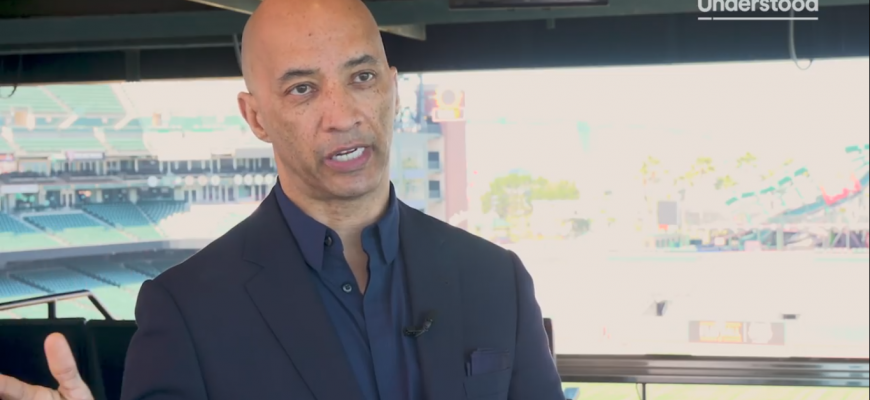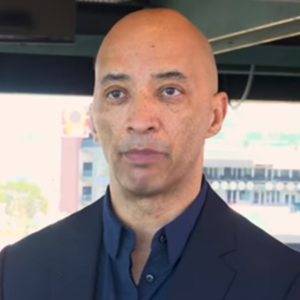My name is Byron Pitts. I’m the co-anchor for Nightline for ABC News. I’m a professional journalist. I didn’t learn to read until I was 12 years old. I spoke with a stutter until I was 20, my junior year in college.
I was bullied in school. Words like dummy, stupid, followed my name and followed me around. I didn’t know what self-esteem meant at the time, but I didn’t have much of it.
Eventually, in elementary school I was placed in the basement, with the basement boys as we were called, and oftentimes what got you in the basement is if you were a discipline problem. I wasn’t. I was a polite kid.
I was raised right as they say, but I couldn’t read. And so therefore, I think there was this assumption that because I couldn’t read, that I was A. dumb, and B. if not yet, soon to be a discipline problem.
When I was tested, and I couldn’t read by about the age of 11, maybe 10, the diagnosis was, according to the doctor they told my mother I was mentally retarded. And so that’s the one label I was given.
When my mother heard that, when she stopped crying, we got to work to find me help. There was none available, and so with her grit and God’s grace, she figured it out for me.
This was 1972 Baltimore, Maryland, and if you haven’t noticed I’m black, and I was poor, and there were not a lot of resources for people who fit in either one of those categories.
In fact, I remember that the doctors told my mother that, because they said she lacked the resources to get me help, and there was no help available, their only recommendation was that she either A. place me in an institution for the mentally retarded, mentally disabled, or bring me back when I was 18 years old.
And my mother recognized herself at the time, with a 10th-grade education, that
that wasn’t an option. She said if I wait until my child is 18 years old, my boy will be dead or in prison. He needs help right now, and none was available.
Eventually, she got me into an adult literacy program. She begged and pleaded, and for some reason they decide to let this 11-year-old kid enroll in this program with truck drivers and blue-collar men mostly, who were seeking to learn how to read as adults.
There’s certainly lots of children in our country, and even some adults, who need this kind of help. They need the expertise, the love of people who are committed to this kind of work.
It seems to me the only question is, providing the funding to get those people to the people who need them.
All that I am in this life, I owe to my mother, Clarice Pitts. God called her home about five years ago. My mother used to have a great saying, she used to say, “Son, smart people can think their problems away, we’ve got to wrestle ours to the ground.”
My mother certainly rejected the label that I was stupid, but she was willing to concede that maybe I might not go to an Ivy League school someday, or I might not find the cure for cancer. But she thought that I could live a full and productive life.
My mother was a blue-collar woman. I mean, she had her first child when she was 17, she had me before she finished high school. For most of my childhood she had a 10th-grade education.
She was a seamstress at the London Fog coat factory in Baltimore where we’re from. So no one in my house pretended to be super smart.
And so my mother thought, “OK, some people may have the resources or the intellect to think their way through a problem, or to get the resources they need.” We didn’t have resources, and we perhaps weren’t the smartest family in Baltimore. But my mother believed that with hard work, and also, beyond hard work and a strong faith, an optimistic spirit.
By age 10, 11 and 12, for most people, reading is like breathing. And I couldn’t breathe. I couldn’t read.
In fact, it’s one of the reasons why I became a journalist. Because in many ways as a journalist, my job is to give voice to the voiceless, and for the first 12 years of my life, I felt voiceless.
I remember when I went to college, and it was one of those career days, and the question was, “What do you want to do with your life when you finish college?” And I said, “I want to be a J-J-J-J,” because J’s, oddly enough, one of the sounds I struggle with… said, “Journalist,” and people laughed.
At first glance, it may seem odd to some people that someone who struggled with literacy and speech chose a profession where I’m required to read and speak most days. I think that that stems from my faith, my optimism. I was raised to believe that all of us have a God-given purpose. I was raised to believe that every challenge is meant to teach us something. And so everything that’s happened in my life, good or bad, was in some way meant to make me better.
Because I learned to read relatively late in life, I love words perhaps more than the average person. Because of my stutter, I know what it’s like to not be heard, or be afraid to speak, and as a journalist it is my job fundamentally to give voice to the voiceless.
Why not, why couldn’t that be my life’s work? And it is. One of the upsides, I think, that comes from having challenges, mine being literacy and speech, is that it forces you to have some measure of empathy.
It forces you to recognize what it feels like to be ‘other’. So when you see ‘other’, however you define that, in someone else, you recognize it. And I think all of us, on our best days, we hope to treat people better than we were treated.
And so, as I look at it now, one of the biggest blessings, two of the biggest blessings in my life were not being able to read as a child, and speaking with a stutter.
One of the great benefits for me in overcoming my stutter and learning how to read, is that it teaches you, certainly optimism to believe that tomorrow can be better than today, but also a measure of toughness, right. I mean, I know for a fact just based on my life experience, that I’m a pretty tough guy. I’m emotionally tough, I’m mentally tough. And that’s what hardship taught me. That’s what not being able to read taught me.
My faith is fundamental to who I am. I learned to read because I had wonderful teachers, a loving and supportive mother, and because of my faith in knowing that tomorrow could be better than today.
From my own life experience, and watching it in my mother’s life, for me, faith isn’t like the air. For me, faith is like the clothes I have on, the clothes you have on, the building that we’re in. I mean, I can touch it. I can feel it.
There were days in my life, certainly as a child, when… I mean think about it, that there were professional people, right, people who had doctorate degrees, who told my mother, this woman with a 10th-grade education, that your son is mentally retarded. He can’t read. He’ll never learn to read.
Nothing about my mother’s own academic experience or my own would have said, those experts were wrong. It was my mother’s faith that told her they’re wrong. That’s not the destiny God has for my child.
For those parents of children who have issues, I want them to know two things. One from a child’s perspective. It seems to me what I learned from my mother is that all you want is for the adult in your life to love you no matter what and to be with you no matter what.
Because it’ll be what it’s gonna be, but if you know there’s someone in your corner, it’s OK.
And from my mother’s perspective, know that whatever it is you have to give your child, if you max out on that, it’ll be enough.
If you’re a child with challenges, there are enough people in the world who are telling you what you can’t be, what you can’t do, all the negatives. But if you have one person, just one voice, that says, “We’re gonna get through this together. You’re not alone.” That’s everything.
So I say to those parents, just hang in there. As my mother would say, just love them to death. Love them to death. Support them. Give them everything you got. And whatever that is, it’ll be enough.




















What an inspiring testimony. Thank you !
Pleasure Cheri
Thanks for sharing this. I had simular problems growing up and my dyslexia was never recognized even though I had severe problems pronouncing and spelling words properly. I know now from doing a teacher training course for dyslexia I also had trates of ADD, dyspraxia and auditory processing disorder. I was called stupid and laughted at so much while l was at school but then had the determination to flourish and be successful. I now write my own Scripts as a hypnotherapist and inspire people through my therapy, imagination and intuition. Unfortunately my son has got similar trates that l have and ODD on top. This makes him defiant against me when trying to help him. They don’t recognize dyslexia in the state of Florida so it’s hard to get him help. I would love suggestions. As l did, he uses humor to mask his problem but now plays the roll of the class clown. His reading skills were up to grad but he hasn’t progressed in the last 3 years. His last class was with the Esol kids that speak English as a second language. Could you recommend any books for 11 years old boys with these issues.
Joanne, we are using an online program called EasyRead by David Morgan. It’s not cheap but it’s worth the investment. My son enjoys it and his reading is continuously improving. There’s a 10 lesson free trial in which you get a good feel for whether it will work for you or not.
We are using EasyRead as well, and my daughter has made the most progress with this program than anything else she has ever tried. It is a very personal program, they really get to know how your child learns, and the reasons why certain things are happening.
Hi Joanne, when my 12 year old son was reading at an 8 year old level, I introduced him to this program https://www.dyslexiadaily.com/product/ttrs-touch-type-read-spell/ The result was he went up to the right reading age within 12 months of using the program. Make sure he gets 90% for each tutorial. It is about speed not accuracy at the beginning. He will get faster as time goes on. Also use the discount code as we are the only ones who get this. Let me know how he goes. Kind regards Liz D
What an inspiring story of love and faith!
LOVE your inspiring stories I can share with my dyslexic 12 year old son. Thank you!